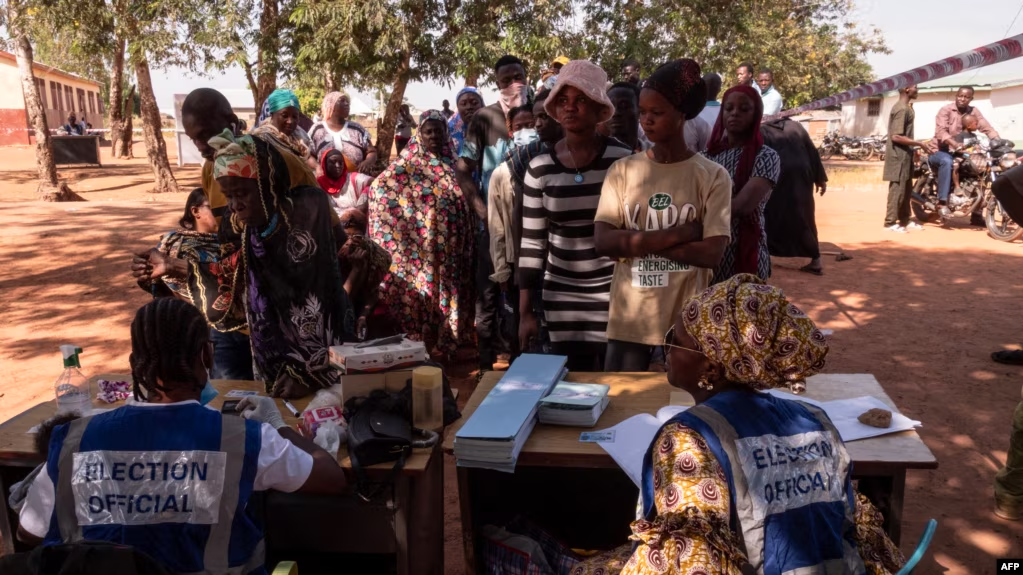Polls close in Ghana elections amid economic concerns

Polls have closed in Ghana’s presidential and legislative elections, testing the country’s democratic stability in a West African region affected by political violence and coups.
Voting began at 7am local time (07:00 GMT) and ended at 5pm (17:00 GMT) on Saturday, with early results expected on Sunday. The final presidential results are likely to be announced by Tuesday.
The election featured a tight race between Vice President Mahamudu Bawumia and former President John Mahama, with the economy emerging as the dominant issue. Both candidates hail from northern Ghana, a shift from previous elections where the south played a more influential role.
Key issues in the election
The election was framed by economic challenges, including high inflation, debt default, and Ghana’s $3 billion bailout deal with the International Monetary Fund.
Bawumia, representing the ruling New Patriotic Party (NPP), is a UK-educated economist who emphasized continuity in digitalization, free education, and healthcare initiatives. “I know what I want to do from day one in the presidency. Give me the chance to transform this nation,” he told supporters during his campaign.
Opposition candidate Mahama, who served as president from 2012 to 2017, has pledged to “reset” the economy by creating a “24-hour economy,” boosting industrial productivity, and renegotiating Ghana’s IMF agreement.
Illegal gold mining, a growing issue in Ghana, also shaped the election. The practice has expanded under President Nana Akufo-Addo’s administration despite his promises to curb it, damaging rivers and cacao farmlands crucial for exports.
Voter turnout and incidents
Approximately 18.8 million Ghanaians were registered to vote in the elections, with previous voter turnout averaging around 70 percent. However, voter apathy appeared significant in this election.
Reporting from Accra, Al Jazeera’s Ahmed Idris observed low turnout across the capital, with some polling stations quiet shortly after opening.
Voting was largely peaceful, though one person was reportedly shot dead, and four were arrested at a polling station in the northern region of Nyankpala.
In Jamestown, Accra, early voter Comfort Saaquah Aidoo said she wanted a change in government. “The old one can’t do the work properly; they promised and failed,” she said. Joyce Adjadji, a teacher, echoed similar sentiments, citing the harsh cost of living as a reason for voting for a new administration.
Ghana’s democratic legacy
Ghana’s two dominant parties, the NPP and the National Democratic Congress (NDC), have alternated power since 1992. However, no party has managed to win three consecutive terms, a milestone the NPP hopes to achieve with Bawumia’s candidacy.
President Akufo-Addo, completing his two terms, leaves a mixed legacy, with his economic policies under scrutiny as Ghana battles rising inflation and a struggling economy.
Beyond economic concerns, security remains a pressing issue, with risks of instability in northern regions due to conflicts in neighboring Burkina Faso and Niger.
Electoral process and next steps
The government temporarily closed all land borders from Friday to Sunday to safeguard the electoral process. Votes are being counted, with the full results for the presidential race expected by Tuesday.
Ghana, often seen as a beacon of democracy in West Africa, has faced moments of political tension, including an outright brawl in parliament during its 2021 inauguration.
Despite such incidents, the nation continues to uphold its tradition of peaceful transitions of power.
The outcome of this election will determine Ghana’s leadership and approach to resolving its economic challenges.
Both Bawumia and Mahama have presented starkly different visions for the nation’s future, leaving voters with a critical choice.








